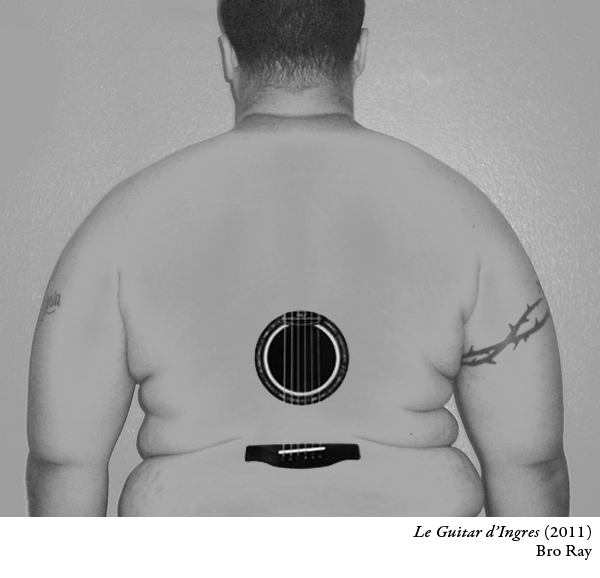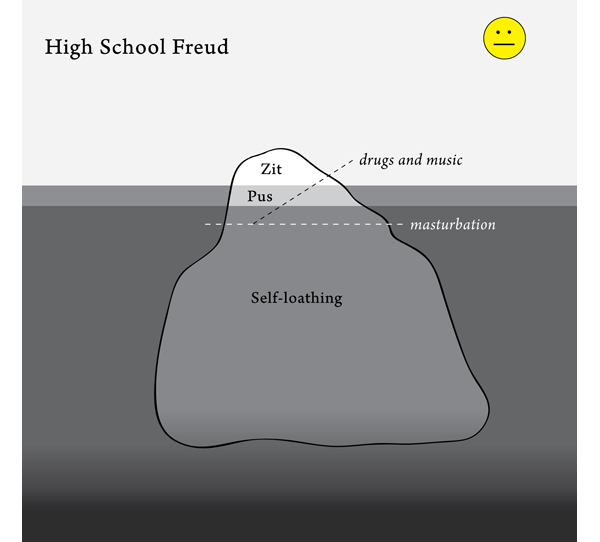Writer archetypes based on Weezer album cover

Overweight
The overweight writer is often the “stay at home” dad, an economically emasculated man whose wife’s once romantic/idealistic patience declines in direct proportion to the angle of his erection. He wakes up at 10:17am, makes himself two eggs and some sausages, and sips OJ while rummaging through last Sunday’s New York Times for culturally significant “ideas”; this lasts for 50 minutes until he’s on the PS2 again, ignoring the litter- and in-box hosting fresh poop and manuscript rejections, respectively. 3.5 years and 35 lbs. later, he’s looking for that perfect parking spot right next to Barnes & Noble because he can’t stand to walk the 40 yards for that once read DeLillo novel he swears will re-influence him. The XL shirt he got at Nordstrom rack does well to hide the love handles/beer belly, but no made in Singapore linen’s gonna hide that vacancy sign on his receding hairline.
The Kids are Albright
 Erica Albright may be Erika Albright, depending on your Roman or Germanic tendencies, and these two people may or may not be one person, an actual living person who actually does normal warm blooded things like have a facebook account, or she is merely the invention of a screen writer whose agency is to represent the “common” folk, the morally clear dissenters of a would-be contemporary hero. “And I want you to know, from the bottom of my heart, that that won’t be true. It’ll be because you’re an asshole,” Erica says before leaving the supposed asshole. This took place over a beer, the best time to call someone an asshole. But all this is fiction, of course, a fiction that doesn’t seem to end when the film does; you see, the warm blood folk like you and me but maybe with more time created facebook accounts for Erica, so so many, that it ceases to be possible or important to know who the real one is. We live in a time where “real” is a disclaimer, almost a kind of warning. This isn’t anything new. Jesus has the most facebook, twitter, and myspace accounts, and let us not explode our heads pondering the ironic to earnest ratio. Hitler and Christopher Walken probably come in a close second and third. Erica’s dignified and morally minded dissent from our hero has propelled her into a modern Joan of Arc, each “like” the blue flame of a smart phone under the sheets checking for that final text. Zuckerberg’s “real” girlfriend, whom he was dating during the time implicated in the movie, is a Chinese-American med student, whose race was smartly passed over because nobody wants to see Joy Luck Club II: The Bitch is Back or something. Erica is much more suited to fill the role of the strong liberated American college girl. A quick image search for “Erica Albright” yields many pictures of similar looking girls, some of whom are the actress Rooney Mara, all of them fairly attractive, all supposedly, according to the proclamations on their linked blogs, the real Erica Albright. My favorite scene of hers (Mara’s) is her look of betrayal after Zuckerberg publicizes their falling out and his true feelings about her online. Director David Fincher, pulling at the eyestrings, sets an off-camera light perpendicular to her ostensible tears which reflect perfectly into the camera, the result of which brings to mind, for me, Vermeer’s “Girl with the Pearl Earring,” with those two glistening sad constellations of eyes. This is all good directing, and good acting, and please don’t say it’s cheesy because you ever have macaroni and cheese without the latter lubricant? It sucks. Cheese is all we have left, a mother’s milk gone bad we savor anyways. I don’t know why heroines can’t just be heroes. Every special word given to a woman seems to subjugate her. Marie Antoinette lost her head during the revolution, and ours, fortunately, is relatively much more mild. Pretty basic life stuff: a kid with freckles makes a billion dollars; a girl dumps him but it’s okay because money isn’t everything; and the populace, we the consumed, invent stories about who these people are, or might be. The daytime stories become bedtime stories. “There once was a nerd who became a billionaire nerd.” Somewhere out there a kid just friended the Erica Albright account which he deemed to hold the most verity. Truth, now, lies on one side of the dice. I imagine this kid in his bedroom (a special kind of boredroom) hitting refresh over and over again with his index finger, waiting for someone who doesn’t even exist to say yes, yes, I am here. I accept you.
Erica Albright may be Erika Albright, depending on your Roman or Germanic tendencies, and these two people may or may not be one person, an actual living person who actually does normal warm blooded things like have a facebook account, or she is merely the invention of a screen writer whose agency is to represent the “common” folk, the morally clear dissenters of a would-be contemporary hero. “And I want you to know, from the bottom of my heart, that that won’t be true. It’ll be because you’re an asshole,” Erica says before leaving the supposed asshole. This took place over a beer, the best time to call someone an asshole. But all this is fiction, of course, a fiction that doesn’t seem to end when the film does; you see, the warm blood folk like you and me but maybe with more time created facebook accounts for Erica, so so many, that it ceases to be possible or important to know who the real one is. We live in a time where “real” is a disclaimer, almost a kind of warning. This isn’t anything new. Jesus has the most facebook, twitter, and myspace accounts, and let us not explode our heads pondering the ironic to earnest ratio. Hitler and Christopher Walken probably come in a close second and third. Erica’s dignified and morally minded dissent from our hero has propelled her into a modern Joan of Arc, each “like” the blue flame of a smart phone under the sheets checking for that final text. Zuckerberg’s “real” girlfriend, whom he was dating during the time implicated in the movie, is a Chinese-American med student, whose race was smartly passed over because nobody wants to see Joy Luck Club II: The Bitch is Back or something. Erica is much more suited to fill the role of the strong liberated American college girl. A quick image search for “Erica Albright” yields many pictures of similar looking girls, some of whom are the actress Rooney Mara, all of them fairly attractive, all supposedly, according to the proclamations on their linked blogs, the real Erica Albright. My favorite scene of hers (Mara’s) is her look of betrayal after Zuckerberg publicizes their falling out and his true feelings about her online. Director David Fincher, pulling at the eyestrings, sets an off-camera light perpendicular to her ostensible tears which reflect perfectly into the camera, the result of which brings to mind, for me, Vermeer’s “Girl with the Pearl Earring,” with those two glistening sad constellations of eyes. This is all good directing, and good acting, and please don’t say it’s cheesy because you ever have macaroni and cheese without the latter lubricant? It sucks. Cheese is all we have left, a mother’s milk gone bad we savor anyways. I don’t know why heroines can’t just be heroes. Every special word given to a woman seems to subjugate her. Marie Antoinette lost her head during the revolution, and ours, fortunately, is relatively much more mild. Pretty basic life stuff: a kid with freckles makes a billion dollars; a girl dumps him but it’s okay because money isn’t everything; and the populace, we the consumed, invent stories about who these people are, or might be. The daytime stories become bedtime stories. “There once was a nerd who became a billionaire nerd.” Somewhere out there a kid just friended the Erica Albright account which he deemed to hold the most verity. Truth, now, lies on one side of the dice. I imagine this kid in his bedroom (a special kind of boredroom) hitting refresh over and over again with his index finger, waiting for someone who doesn’t even exist to say yes, yes, I am here. I accept you.
Giorgio Morandi & Daren Wilson

If you google image search “morandi” you’ll be searching for Giorgio Morandi, a relatively unsung Italian painter who spent his adult unmarried life living with his sisters in Bologna painting the same twenty or so objects for decades upon decades, obsessively rearranging them, emptying himself of bias towards the “subject” until the objects held no more importance than the unattributed space they resided in. When, it is said, they asked him why he never dusted the objects, he said that such furriness was visual time. I’m paraphrasing of course. Morandi is my favorite artist because of his faithful reticence, his solemn humor and patience. Daren Wilson is an artist who copies Morandi with an earnestness that seems to precede any postmodern tendency, hanging his paintings “salon” style in what seems to be his studio. I like Daren Wilson a lot. And so, it is both auspicious and odd how I, we, are here — looking at things that are real and not real. The representation of objects in oil; the representation of oil in pixel; the representation of space as contour; the representation of physical objects which we’ve accepted we’ll never touch. Touch your screen, I dare you.








